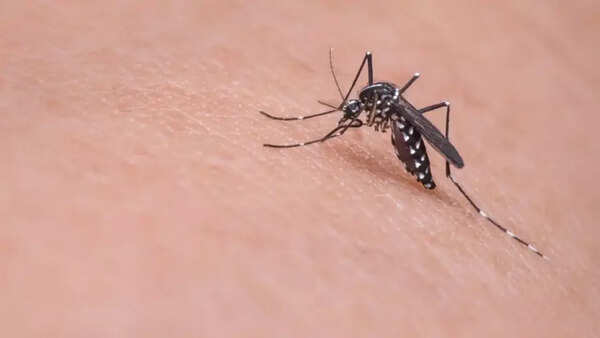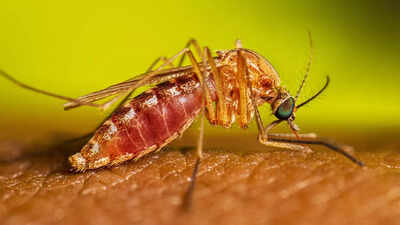West Nile virus (WNV) is spreading through mosquitoes in Fulton County, Georgia. Two mosquito traps – in Hapeville and northwest Atlanta – in Fulton County tested positive for the West Nile virus, according to the Fulton County Board of Health.The virus is primarily transmitted to humans through the bite of infected mosquitoes, which acquire the virus by feeding on infected birds. With no vaccine or targeted antiviral treatment available for humans, prevention and awareness are the primary defenses. While most people don’t experience severe symptoms, those over 50 and individuals with weakened immune systems are at higher risk for complications like encephalitis or meningitis.Let’s delve into the science behind WNV transmission, its impact, and how individuals can stay vigilant and safe.
What is West Nile Virus?
West Nile virus is a single-stranded RNA virus that causes West Nile fever. It is a member of the family Flaviviridae, from the genus Flavivirus, which also contains the Zika virus, dengue virus, and yellow fever virus. The virus is primarily transmitted by mosquitoes, mostly species of Culex.

Why the name?The virus was initially identified in the West Nile district of Uganda in 1937. It has since spread globally, including Africa, Europe, the Middle East, Asia, Australia, and North America.
How does WNV spread?
West Nile virus (WNV) is primarily spread to humans through the bite of an infected mosquito. Mosquitoes become infected when they feed on birds that carry the virus. Humans, horses, and other mammals can then contract WNV from the bite of an infected mosquito.Mosquitoes, particularly certain species of Culex mosquitoes, are the main vectors for WNV. They become infected when they bite birds that carry the virus. Birds, especially certain species like crows and jays, are considered amplifying hosts, meaning they can carry high levels of the virus in their blood, making them efficient transmitters to mosquitoes. When an infected female mosquito bites a human or other mammal, it injects saliva, which can contain the virus, into the bloodstream.While mosquito bites are the primary route, WNV can also be transmitted through blood transfusions and organ transplants, as well as from mother to child during pregnancy, delivery, or breastfeeding. There have also been rare cases of transmission in laboratory settings and through oral-fecal routes in alligators and crocodiles.However, West Nile virus is not spread through casual contact with infected individuals or through the air. Moreover, mammals like humans are “dead‑end hosts” because they typically don’t carry enough virus in their blood to facilitate further mosquito infection.Peak transmission occurs between July and October, a period marked by warm, humid weather that favors mosquito breeding and bird activity.

Who are at risk?
Although most people infected with West Nile virus remain asymptomatic (~80%), around 20% experience West Nile fever – flu‑like symptoms including fever, headache, fatigue, and sometimes rash. Less than 1% develop neuroinvasive disease (meningitis or encephalitis), marked by high fever, neck stiffness, confusion, tremors, or paralysis – conditions that can be fatal in about 10 % of these cases.Individuals over 60, organ transplant recipients, and those with weakened immune systems or certain chronic (comorbid) conditions like diabetes, high blood pressure, or kidney disease are at higher risk of severe West Nile virus illness. While anyone can be bitten by an infected mosquito, these groups are more likely to experience serious complications if infected.Additionally, people with weakened immune systems, due to conditions like HIV/AIDS, cancer, or undergoing chemotherapy, are more susceptible to severe illness. Individuals who have received organ transplants are at increased risk due to the immunosuppressant medications they take to prevent organ rejection.While not a direct risk factor for acquiring the virus, pregnant women and breastfeeding mothers should be cautious and consult with their doctor if they experience symptoms.
Precautions and safety tips
To prevent West Nile virus (WNV) infection, the most important precaution is to minimize mosquito bites. This involves using insect repellent, wearing protective clothing, and reducing mosquito breeding sites. Additionally, limiting outdoor activities during peak mosquito hours (dusk and dawn) and ensuring proper screening of windows and doors can help reduce exposure.Department of Public Health and the CDC recommend:Avoid peak mosquito activity: Be cautious at dusk and dawn, when Culex mosquitoes are most active.Use EPA‑registered insect repellents: DEET, picaridin, IR3535, or oil of lemon eucalyptus are recommended.Dress smart: When outdoors, especially during peak mosquito hours, wear long sleeves, long pants, and a hat to cover as much skin as possible.Eliminate standing water weekly: Dump water from flowerpots, gutters, and water bowls, as mosquitoes need only a bottlecap’s water to breed.Maintain screens and doors: Install and repair screens on windows and doors to keep mosquitoes out.Use mosquito netting: If you are sleeping outdoors or in an unscreened area, use mosquito netting to prevent bites.Be informed and report: Stay updated on local alerts and report stagnant water or dead birds to county health officials.Be aware of travel risks: If traveling to an area with known WNV activity, take extra precautions and consult with your doctor about necessary preventative measures.

